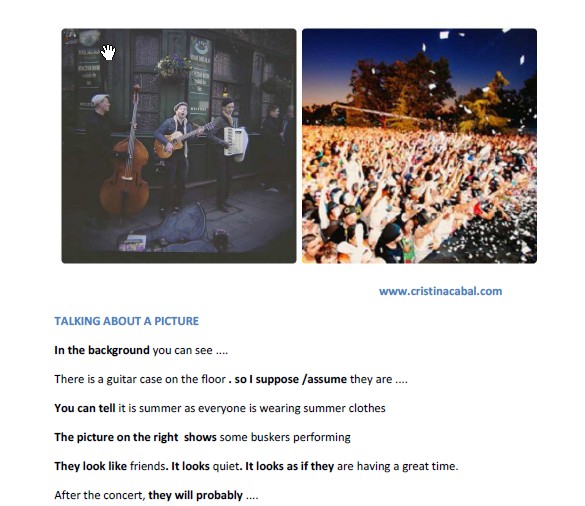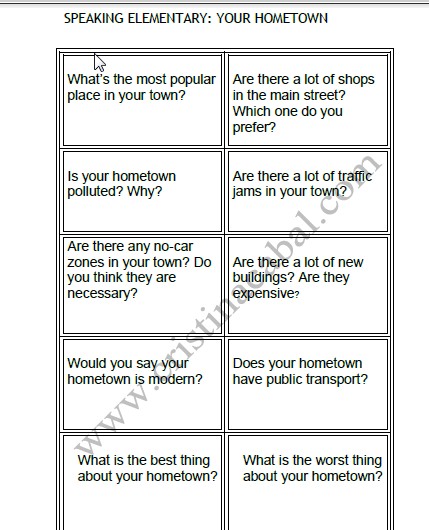OMG! Where does time go? It seems only like yesterday when with butterflies in my stomach I greeted my new students.  It was early October and, at that time, the course seemed long enough to last a lifetime, and just now I ‘ve realized that spring is technically here, in fact, it ‘s been here for several days though I don’t feel exactly in on spring-mode and… it doesn’t help that it’s been raining on and off for the last few days. 🙁
It was early October and, at that time, the course seemed long enough to last a lifetime, and just now I ‘ve realized that spring is technically here, in fact, it ‘s been here for several days though I don’t feel exactly in on spring-mode and… it doesn’t help that it’s been raining on and off for the last few days. 🙁
Anyway, the Certificación exam is fast approaching and we need to practise a lot, especially speaking.
In the second part of the oral exam you will be asked to describe pictures ( a max. of three) and, in this part, you will be on your own. The examiner won’t ask you any questions.
REMEMBER
♥the pictures are just an excuse to talk about the topic
♥describe what you can see, comparing and contrasting the pictures. We don’t want you to describe in detail, just give a general description.
♥Use a wide variety of vocabulary and structures. Join your ideas using connectors.
♥Talk about the topic explaining your point of view.
♥Normally the pictures show different sides of the same issue. Say which one you would choose and why.
You have three minutes to shine 🙂
LET’S PRACTISE WITH THESE PHOTOS. (click here to see the original)
 Some ideas to help you talk:
Some ideas to help you talk:
How important is music in your life?
How much time do you spend listening to music each day or week?
Do you think music is getting better or worse?
Do you ever go out to listen to music live? When was the last time you went to a concert/gig? Gig /ɡɪɡ/ is a slang word than means live performance
Now, let’s try this one. Original here

How important is music in your life?
How much time do you spend listening to music each day or week?
Do you think music is getting better or worse?
Have you ever illegally downloaded music? Do you think it is okay or not okay to download music illegally?
With the increasing rise of downloading from the internet, what do you think the future of the music industry is?
Do you think music is getting better or worse?
 explanation.
explanation.



 during the 90 minutes is quite important to maintain their level of attention. In this sense, fortunately, teaching a language is not the same as teaching some other subjects where the range of activities you can do is a bit more restricted.
during the 90 minutes is quite important to maintain their level of attention. In this sense, fortunately, teaching a language is not the same as teaching some other subjects where the range of activities you can do is a bit more restricted.